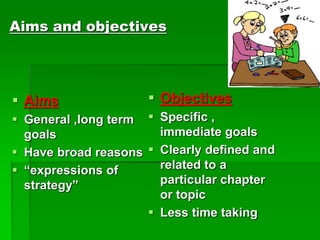Aims and objectives of Mathematics.
- 1. Aims, Objectives and Scope of Mathematics . Dr. Roma Smart Joseph Teacher Educator Lucknow, UP, India
- 2. Aims and objectives Aims General ,long term goals Have broad reasons “expressions of strategy” Objectives Specific , immediate goals Clearly defined and related to a particular chapter or topic Less time taking
- 3. General aims of teaching Mathematics To understand the use of numbers and quantities related to their daily life To enable child to solve basic Mathematical problems To develop in child fundamental skills like logical reasoning, critical thinking. To develop the habit of concentration , self- confidence and discovery To inculcate scientific and realistic attitude towards life.
- 4. Objectives of teaching Mathematics To indicate the direction of pupil’s growth To provide basis for selection of evaluation procedures For planning and organization of learning experiences For well defined, clear , measurable outcomes of teaching mathematics.
- 5. Classification of objectives under Bloom’s taxonomy : Cognitive Affective Psychomotor
- 6. Aims and objectives of teaching Mathematics at different stages of education 1. At primary stage (under cognitive) To teach the concept of size and shape of an object To give knowledge of measurement To teach about whole nos. ,prime nos., fractions etc To teach tables (under affective) To develop interest in mathematics Confidence to solve problems
- 7. To develop sense of truthfulness, exactness and regularity (under psychomotor domain) To develop skills of counting Skills to apply rules in problem solving like BODMAS To be able to measure and construct figures
- 8. 2. At middle and secondary stage To develop thinking and reasoning powers of child Develop problem solving attitude To develop sense of accuracy, observation, logical thinker To develop never give-up attitude To help student understand units used and their application To enable child use maths with other subjects and their co relation
- 9. National policy on education also emphasised that at the end of high school stage , child should achieve following objectives- To be able to acquire knowledge and understanding of terms ,concepts ,laws formulae, symbols etc Develop skills of measuring, drawing, estimating, evaluating, concluding
- 10. To develop the ability to think, analyse, reason, prove etc appreciate the beauty of mathematics apply mathematical knowledge in daily life should be able to use technological devices like calculators, computers etc
- 11. Scope Mathematics teaches- Patience Discipline Step-by-step problem-solving skills. An unlimited number of career opportunities are available For those who have a substantial background in Mathematics
- 12. The following list briefly describes work associated with some Mathematics-related professions: Actuary Mathematics teacher Operations research analyst Statistician Research scientist Robotics engineer
- 13. Civil engineer Chartered accountants Banking Pilot Chemists Civil services Astronomy Aeronautic engineering














